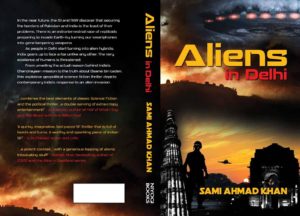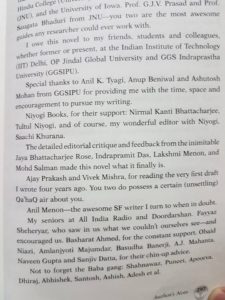Sami Ahmad Khan, Sci-Fi writer from India
 I first came across Sami Ahmad Khan a few years ago when he reached out regarding a manuscript he had written and wanted it evaluated professionally. It was one of the few science fiction novels I had read set in contemporary India. I did read and made a few constructive suggestions. Then I did not hear from him for a while as he was busy finishing his thesis unsurprisingly on contemporary Indian science fiction writers. Now his novel is to be published more or less simulataneously by two publishers — Juggernaut Books ( digital) and Niyogi Books ( print). Meanwhile he has published two articles exploring Indian science fiction.
I first came across Sami Ahmad Khan a few years ago when he reached out regarding a manuscript he had written and wanted it evaluated professionally. It was one of the few science fiction novels I had read set in contemporary India. I did read and made a few constructive suggestions. Then I did not hear from him for a while as he was busy finishing his thesis unsurprisingly on contemporary Indian science fiction writers. Now his novel is to be published more or less simulataneously by two publishers — Juggernaut Books ( digital) and Niyogi Books ( print). Meanwhile he has published two articles exploring Indian science fiction.
Daily O article “What if aliens one day land in India? A sci-fi writer asks” ( 8 June 2017)
Huffington Post India article “Aliens In Allahabad, Zombies In Zamrudpur: Discovering Indian Science Fiction” ( 10 June 2017)
Sami and I had a brief and intense exchange over email about his interest in science fiction and the publiction of Aliens in Delhi. Here is an extract:
- Who were the authors you featured in your thesis?
I worked on select (SF) novels/short stories of Anil Menon, Amitav Ghosh, Ruchir Joshi, Shovon Chowdhury, Rimi Chatterjee, Priya Sarukkai Chabria, Manjula Padmanabhan, Vandana Singh, Ashok Banker, Mainak Dhar, Suraj Clark Prasad, and Jugal Mody.
- Who were your PhD guides?
Prof. GJV Prasad and Prof. Saugata Bhaduri at JNU
- Why did you start writing sci fi stories?
I couldn’t resist! I could see eventualities concretizing in my brain, working out and extrapolating from the current material realities…I love doing that. The question of ‘What if?’ really interests me. And SF I think gives me the best mode of narration to express myself. Not to say that writing and thinking about SF gives me a massive kick!
- How did the deal with two publishers happen?
I got two simultaneous offers, within ten days of each other. The first (contract) wanted paperback rights, and the other digital. I opted for both.
- Two Books, Two editors
I sent almost the same MS to both these publishers, and editors from respective houses worked on the MS simultaneously. It’s still the same book, but there are minor differences, such as a different sentence here, a different one there, not to mention different copy-editing. But the essence and general narrative is the same.
- Due dates of publication
Paperback, brought out by Niyogi, already out.
Digital version by Juggernaut in July 2017
- If you had to translate this novel into any other language which version would you use?
Both would do!
- How many years did it take to write this novel?
Almost four and a half years. The first draft was written in October-December 2012. Then I let the novel stew in my brain for some time. Then endless drafts and revisions. I kept reworking it till 2015, when I was finally satisfied with it.
- Who are the SF writers you admire?
Douglas Adams, Isaac Asimov, Shovon Chowdhury, Star Wars, Star Trek, Doctor Who
- Why did you start writing sci fi stories?
I could see eventualities concretizing in my brain, working out and extrapolating from the current material realities…and SF I think gives me the best mode of narration to express myself. Not to say that writing and thinking about SF gives me a kick!
- What is that you wish to explore the most in your SF writing?
Space (interplanetary exploration), time (alternate realities/time travel) and ET life (preferably hostile to humans). I love exploring these themes through pulp.
11 June 2017

